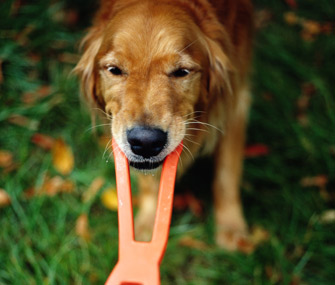How Can I Teach My Dog to Drop a Toy?
Published on November 05, 2012

Q: How do I teach my dog to let go of a toy he is holding in his mouth? He thinks it’s a game of tug when I try to take a toy away.
A: One of the first commands dogs should learn is “drop it,” which teaches them to willingly let go of an item in their mouth, whether it be a toy, chew or miscellaneous item they may have picked up. Drop it can be a lifesaver if your dog has something dangerous in his mouth. I’ve used this before when my dogs have picked up something during a walk or around the house, such as a food item I didn’t want them ingesting. It’s also an essential behavior for dogs to know for polite play.
Drop it is also helpful for teaching dogs to let go of valued resources willingly, which is important in preventing resource guarding. If your dog already shows signs of resource guarding, such as acting aggressively or anxiously (growling, snarling, snapping, freezing in place or showing the whites of his eyes) when you approach his toys, food or resting places, contact your veterinarian for further help and a possible referral to a trainer or animal behaviorist, since this is a critical issue that needs to be addressed by a professional.
If your dog is not guarding his toys but is holding on to them as a form of play, drop it can be an excellent solution.
Teach Your Dog to Drop It
Start with an item your dog doesn’t place a high value on but is likely to put in his mouth, such as a rope toy. Say “take it” and give him the toy. While some dogs may immediately grab the toy, others may need to be coaxed; make this part more exciting by waving the toy excitedly or shaking it right by the ground. You may even need to use a low-value chew, such as a plain rawhide. As soon as your dog takes the toy, praise him.
Now move on to teaching him to let go. Say “drop it” and wait one second, and then do something to get him to let go of the toy in his mouth. For many dogs, this is as simple as placing a treat in front of his nose or — for toy-crazy dogs — pulling out a toy that is even more exciting than the one he already has in his mouth. As soon as he drops what he is holding, mark with a “good” and immediately treat or give the new toy.
I like to move the dog away from the original toy or chew he dropped by tossing the reward out and away so the dog has to move to get the reward, which allows the original object to be picked up in anticipation of the next session.
Make "Drop It" Part of Play
As you practice, teach your dog to respond to the verbal cue by saying “drop it” and waiting a little bit longer each time before doing whatever it is that gets your dog to drop the object. You can also teach him to respond to a hand signal by saying “drop it” and then moving an empty hand, shaped like it is holding a treat, in front of your dog and immediately marking with a “good” when he drops the toy. Once he drops what he is holding, give him a treat or toy as a reward.
Once your dog understands what drop it means and performs the behavior when asked, you can incorporate it into play, such as games of tug or fetch, by making it a condition of the game that he drop the toy on command before the game continues. If he will not drop the toy on command, the game is over.
If your dog ever picks up an item he should not have, ask him to drop it, and then reward him for dropping it or redirect him to a different outlet, such as replacing a sock he picked up with a dog toy that is OK for him to carry in his mouth. Practice this behavior in numerous areas and with various items to help your dog generalize the behavior and make him more likely to let go of whatever item is in his mouth, regardless of the situation.





